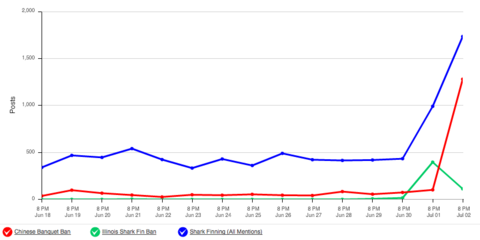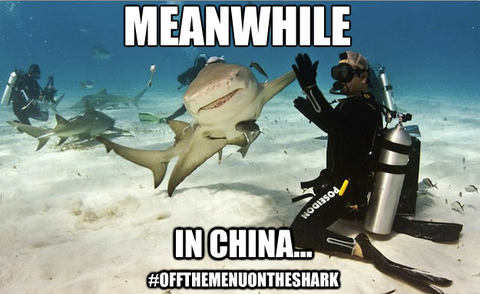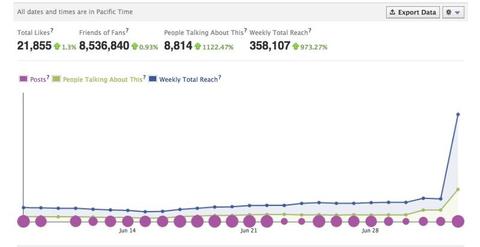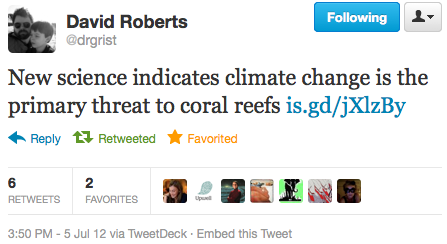Attention Lab Digest - Week of July 2
Despite the oddity of the mid-week holiday, Upwell had a busy week. We more than doubled in size, too! On Monday, we were joined by our newest full-time staff member, Matt Fitzgerald, and on Thursday, three interns joined the Upwell crew. You can read more about them here, and you can follow our intern team on twitter at @UpwellINTERNS.
We sent out three Tide Reports last week (miss them? check out our archives.) and are super thrilled with some of the resulting amplification.
What Makes a Toolkit Tick?
On Tuesday morning, we shared some additional unpacking we did of the Rio+20 conversation, and shared news about the International Whaling Commission's decision against a South Atlantic Whale Sanctuary. We shared our toolkit again, which garnered a few mentions on Twitter. The part of Tuesday's Tide Report that got the most attention was our very own Kieran Mulvaney's blog post on Discovery News - When Orcas Attack. Miriam Goldstein tweeted about it and it was retweeted several times.
Lessons: Overall, there was not very high traffic to our toolkit. We still like toolkits and are pondering how to make them more useful in the future, and will try to prep them more in advance. The content that was most amplified was the most liquid - a video and story about the incredible cooperative attack efforts of Orcas. We'll try to include more amplification ideas around these slippery topics in future Tide Reports.
Our First Ever High Tide Alert
On Tuesday afternoon, we were discussing what content would go out in Thursday's Tide Report, including some information about the shark fin soup ban at China's official banquets. That piece of news was already being shared widely, and we noticed that the conversation about it was still on the rise:

Seeing an opportunity, we decided to send out a "High Tide Alert," with ideas for our readers about how to jump into the conversation and make shark-friendly content spread even wider. We put together an image that played on a familiar internet meme with suggestions on how best to share it on Twitter and on Facebook.

We couldn't have prepared ourselves for the results. Mission Blue posted the image shortly thereafter on their facebook wall, and it has since received over 1,500 shares and over 1,000 likes. The "Talking About This" metric on Facebook aggregates all comments, shares and likes. This post had over 7,200 people talking about it, which was more than double the number of people talking about all of Mission Blue's posts from the last month combined. The page received hundreds of new likes in the same period as well. Thank you so much to Deb Castellana for sharing these metrics with us!

Lessons: Never underestimate the power of a meme! Especially on facebook, image macros that have visual impact and also include a message or story have high virality. Because the message is contained in the image, it remains with it as it is shared widely. The fact that Mission Blue, which already has nearly 22,000 followers on facebook, shared the image, got it off on the right foot. Also, the story was about China and was surprising in its own right, and that contributed to the shareability.
Interesting, but Not Necessarily Shareable
We are on a long quest toward finding the secret sauce that makes something that is interesting shareable. Thursday's Tide Report was an example of interesting content that didn't get amplified. People clicked on all the links in the email, but little was then amplified. Do you think you know an ingredient to the secret sauce? Email us and tell us.
Coral Reefs and Climate Change
Did you see the new study about coral reefs and climate change? It was covered by the AFP, the NY Times and Discovery News. John Bruno tipped us off to the study early Friday morning, and then later posted his own take on the story on the SeaMonster blog. The study seemed to have two real takeaways: climate change poses a HUGE threat to coral reefs, and coral reefs have the ability to potentially recover. There seemed to be a real risk in focusing on the latter, so we shared the study and John's analysis with climate blogger David Roberts at Grist. Why him? Because he's got a pretty level head about the whole climate change thing, isn't afraid to speak his mind, and is a true engager online, participating in conversation.
Moments after our email, David shared the link, with the right message. With the help of his voice and those that retweeted him, this study reached another potential 23,000 people with the right message.

Add a comment